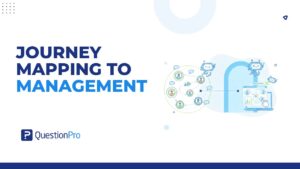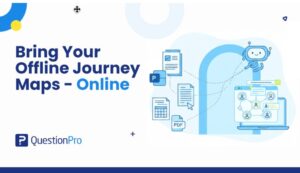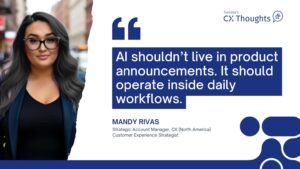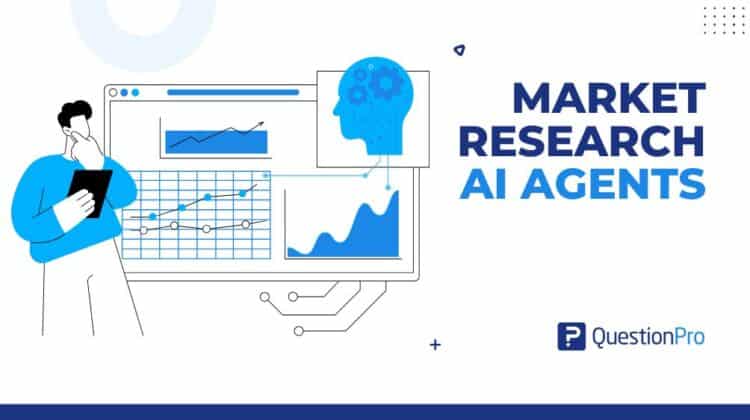
The way surveys and research are done is changing fast and frequently. Market research AI agents help companies move beyond slow, manual methods and gain real-time data insights.
Instead of waiting weeks for results or drowning in data, AI agents can create more intelligent questions, engage with respondents, and analyze answers instantly. They work like digital research assistants running conversational surveys, spotting patterns, and delivering insights quickly.
In this article, we’ll explore what market research AI agents are, the different types, how they work in survey research, practical tips to use them effectively, and the challenges you should keep in mind.
What are Market Research AI Agents?
Market research AI agents are intelligent, AI-powered systems designed to automate and enhance different parts of the research process.
Not just relying on human researchers or slow, traditional methods like focus groups and manual survey analysis, these agents use artificial intelligence to handle key tasks.
They can:
- Collect and organize survey data.
- Run survey analysis.
- Do sentiment analysis.
- Predict market trends.
AI agents can process large amounts of raw and unstructured data from surveys, social media, and other sources. They turn this into meaningful insights, fast.
Think of them as digital research assistants. They help companies understand consumer behavior, spot market shifts, and make better decisions. They are an invaluable asset for businesses, offering both speed and depth to turn research into actionable insights.
Recommended Read: AI User Persona: How to Build, Use Cases & Challenges
The Evolution of Market Research
In the past, research used to rely on traditional methods like focus groups, paper surveys, and face-to-face interviews. These gave great insights but were time-consuming, expensive, and limited in scale.
With the rise of the internet, online surveys changed the way we collect data. They made it faster, cheaper, and more accessible to a wider audience.
Now the industry is moving into a new phase with AI-powered research agents. These can automate the mundane, analyze unstructured data, and give insights in real time. By combining speed with intelligence, AI is changing market research and helping us make better decisions.
Types of Market Research AI Agents
Market research AI agents are changing the way businesses collect and analyze data. They’re like intelligent assistants that can handle specific research tasks that would take hours or even weeks for human researchers to do.
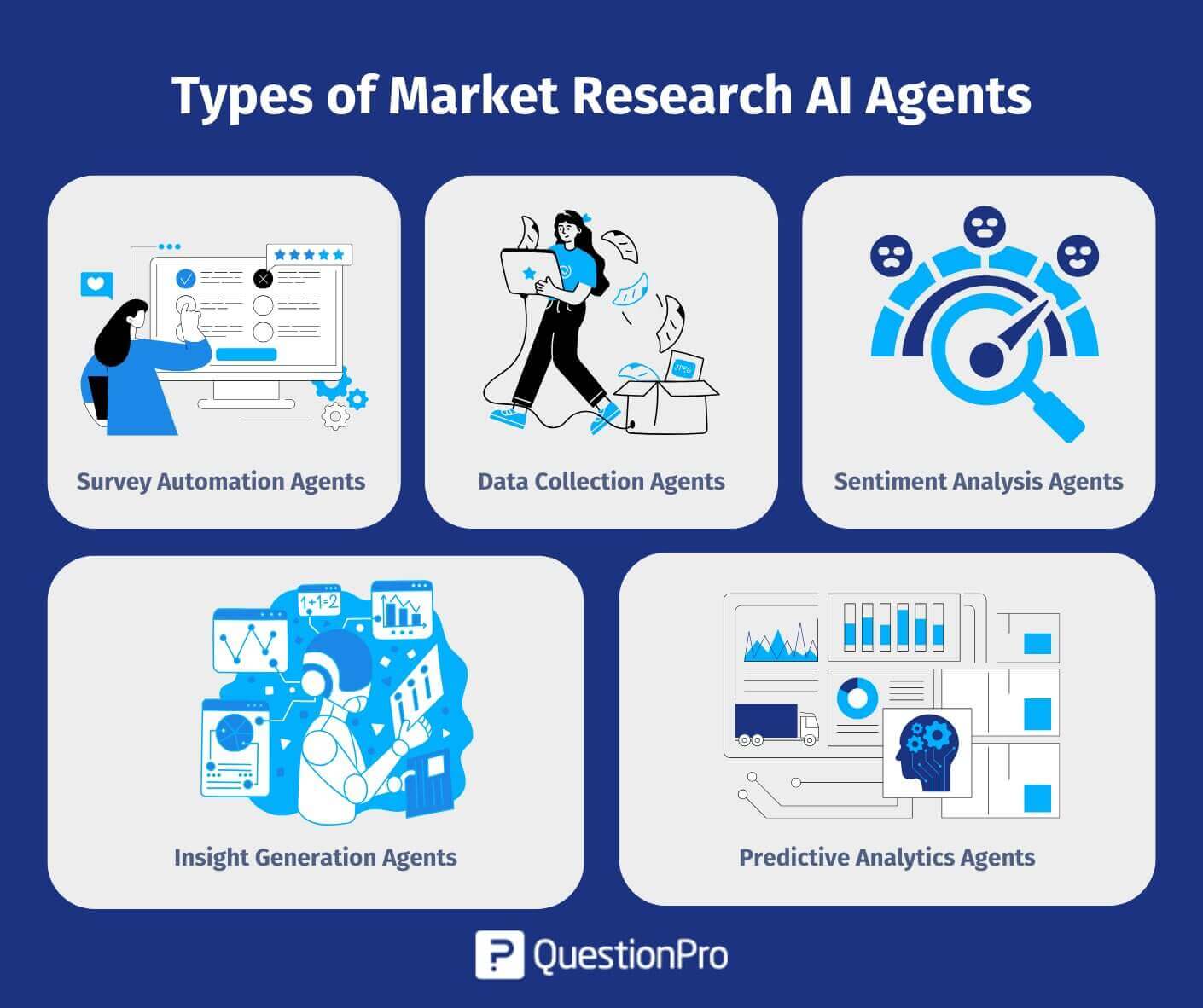
1. Survey Automation Agents
These agents create, distribute, and adjust surveys in real time. They eliminate repetitive tasks and make sure questions are tailored to respondents to improve data quality and response rates.
2. Data Collection Agents
Data collection agents make sure researchers always have the right information to work with. They collect data from:
- Surveys
- Social media
- News articles
They can handle structured data and unstructured data, so researchers always have reliable input for analysis.
3. Sentiment Analysis Agents
These agents analyze open-text responses, reviews, and social media comments. They detect emotions and opinions to give insight into customer satisfaction and consumer preferences.
4. Insight Generation Agents
Insight generation agents turn raw data into meaningful insights. They find patterns, spot emerging trends, and give researchers clear takeaways to inform strategic decisions.
5. Predictive Analytics Agents
Predictive agents use historical data to predict what consumers will do next. By analyzing past patterns, they help businesses stay ahead of the market and plan for the future.
They can:
- Predict market shifts before they happen.
- Support better pricing.
- Prepare businesses for future innovations.
- Anticipate changes in consumer behavior.
Together, these agents cover the entire market research process from data collection to insight generation. They’re enabling researchers to move faster, be more accurate, and focus on creative problem solving, not repetitive tasks.
How AI Agents Work in Market Research
AI agents support different parts of the research process. They make surveys faster, smarter, and easier to manage.
- Survey Automation: AI agents can design surveys, send them out, and adjust questions based on responses. This saves time and reduces repetitive work.
- Smart Sampling & Targeting: They help find the right audience for a study. By identifying specific segments, they make sure the data is more accurate and useful.
- Conversational Research: AI chat agents can talk directly with respondents. They collect open-ended feedback in a natural way, like a conversation.
- Data Analysis: AI agents go through responses, find patterns, and create insights. They turn raw data into clear results that support decision-making.
By working across surveys, targeting, feedback, and analysis, AI agents simplify the entire research process. They give researchers more time to focus on strategy and creative problem-solving.
Learn More: AI Survey: Unleash the Power of AI in Survey Creation
Benefits of Using AI Agents in Surveys & Research
AI agents have many benefits for survey research. They make it faster, more reliable, and more scalable.
- Faster Results: AI agents can design, deploy, and analyze surveys in hours that used to take weeks.
- Better Data: These agents validate responses in real time, spotting bias, fraud, or duplicate answers. So the data you use is cleaner and more trustworthy.
- Cost-Effective: Compared to focus groups or manual survey analysis, AI-powered surveys are much more cost-effective. They reduce repetitive work and deliver meaningful insights.
- Scalable Personalization: AI agents can customize survey questions for different respondents. By making surveys feel more personal, they improve engagement and capture more feedback.
From speed and accuracy to cost savings and personalization, AI agents provide researchers with the tools to enhance survey data and make informed decisions.
Use Cases of AI Agents in Market Research
AI agents are no longer just a future concept; they are already being used in real research projects. They make surveys more interactive, feedback easier to manage, and insights faster to generate.
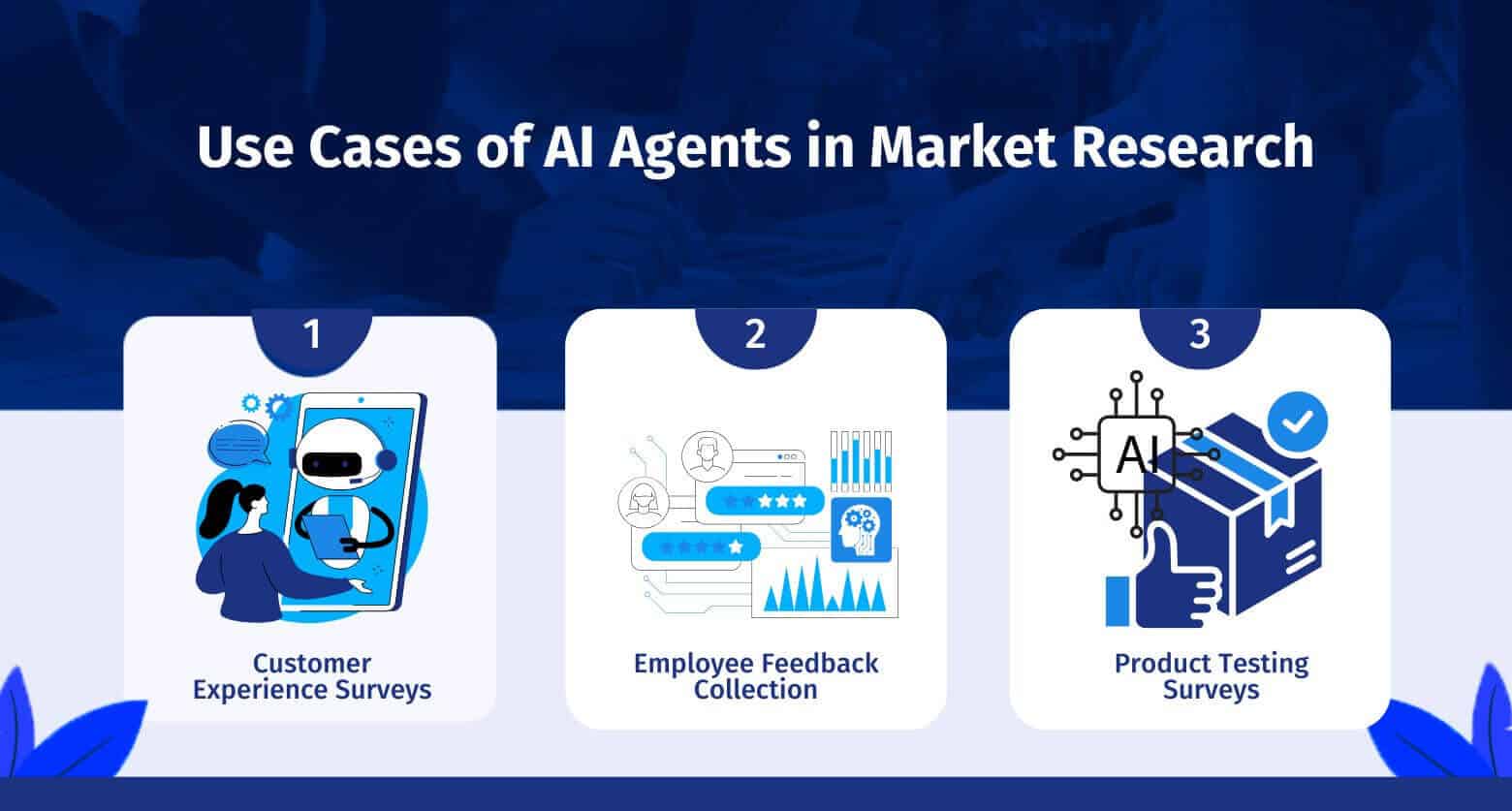
1. Customer Experience Surveys
AI chatbots make customer feedback faster and more natural. For example, an online retailer can use an AI chatbot to ask shoppers about their checkout experience right after purchase.
The chatbot collects answers, analyzes them instantly, and highlights whether customers felt satisfied or frustrated. With this information, the retailer can quickly fix pain points, such as long delivery times or confusing return policies, before they affect more buyers.
2. Employee Feedback Collection
AI agents also help companies keep a pulse on workplace morale. Instead of waiting for yearly surveys, HR teams can send out quick weekly or monthly check-ins.
For example, pulse surveys can ask employees:
- “How motivated do you feel this week?”
- “Do you have the tools you need to do your job well?”
- “What’s one thing that could improve your work environment right now?”
The AI then analyzes these responses instantly. If a majority of employees flag workload as a concern, HR can respond quickly with adjustments, training, or extra support, improving company culture before issues grow.
The AI then analyzes these responses instantly. If a majority of employees flag workload as a concern, HR can respond quickly with adjustments, training, or extra support, improving company culture before issues grow.
3. Product Testing Surveys
When testing a new app feature, AI agents can adjust questions as people use the product. For instance, if a user says the new navigation menu feels “confusing,” the AI can immediately ask, “What part of the menu was hardest to use?”
This follow-up gives developers deeper insights without creating a long, static survey. The result is more useful feedback that guides future improvements and product innovation.
From customer feedback to employee surveys and product testing, AI agents make research faster, smarter, and more meaningful. They reduce repetitive work for researchers while delivering clear, meaningful insights that help businesses make smarter decisions.
Also Check: Top AI Tools for Academic Research: Writing & Data Analysis
Challenges of Using AI Agents in Market Research
Using AI agents has many benefits, but they also have challenges to consider.
- Ethical Concerns: AI models can reflect or amplify bias in the data. If not managed carefully, this can impact the quality of the insights and lead to unfair results.
- Transparency: Respondents may not always be aware that they are interacting with an AI. Being transparent about the use of AI agents is key to building trust and credibility in research.
- Data Privacy and Security: AI agents process a lot of personal data. Protecting that data is key to compliance with privacy laws and protecting respondent information.
- Human Oversight: Even with advanced AI, human oversight is still required. Human judgment ensures insights are accurate, ethical, and aligned with research objectives.
These challenges highlight the need to balance AI efficiency with human responsibility. With the right oversight, AI agents can add to research without losing trust or quality.
How QuestionPro AI Can Advance Your Market Research
QuestionPro AI takes the core strengths of market research AI agents and brings them together in one platform. It helps researchers move quickly from data collection to clear insights without the cost and complexity of large enterprise tools.
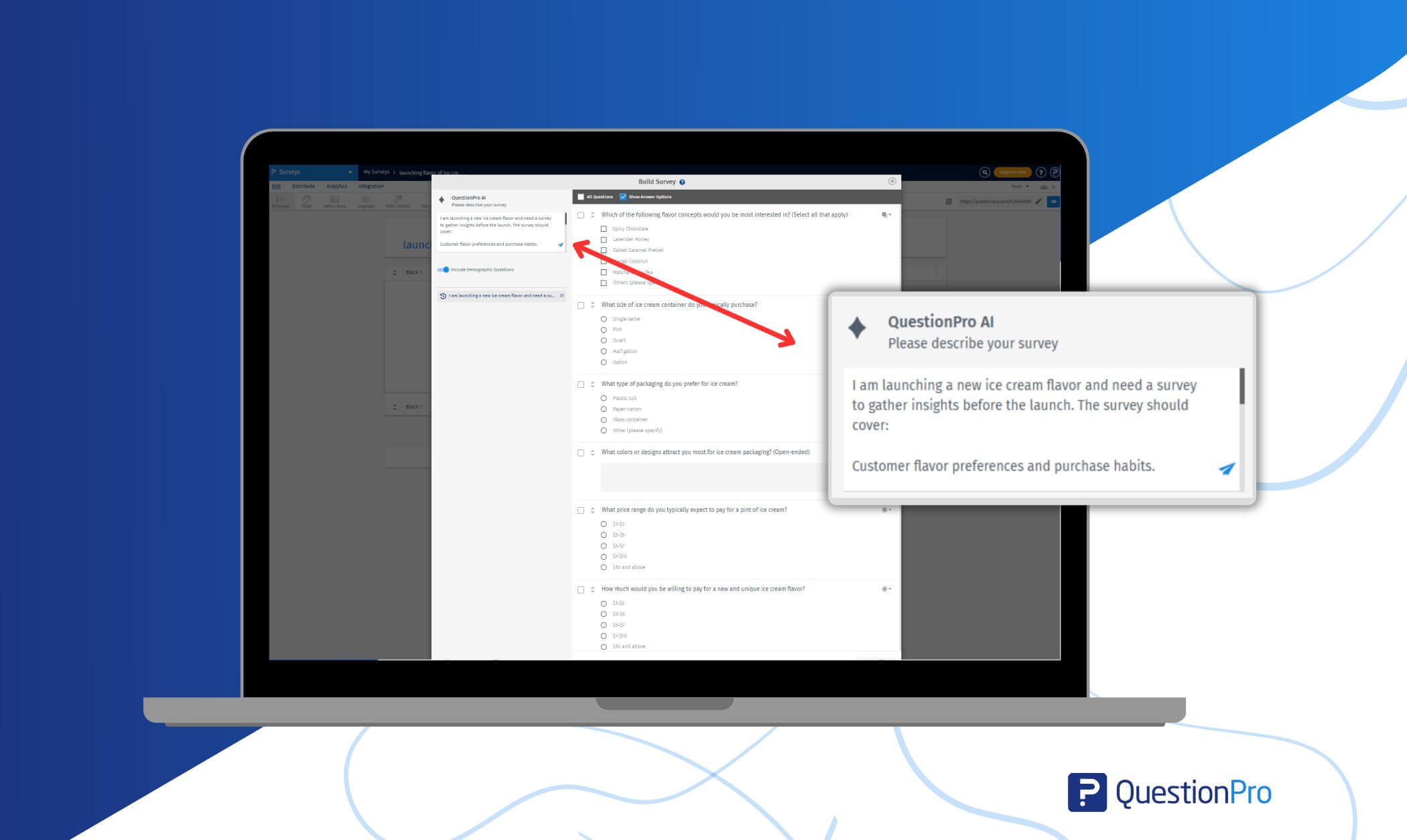
1. AI-Powered Survey Creation
With QuestionPro AI, you only need to share your research topic and goals. The system will generate a complete survey for you in minutes. You can also choose from QuestionPro’s ready-to-use templates to save time and ensure professional question design.
2. Synthetic Data Simulation
Before launching a survey, you can run simulations with synthetic data. This lets you forecast consumer behavior, test pricing strategies, and fine-tune your questionnaire to reduce risk.
3. Real-Time Analytics Dashboard
Survey results are instantly turned into interactive dashboards. Instead of waiting for long reports, you can see insights as the data comes in.
With these dashboards, you can:
- Spot key trends as they develop.
- Detect patterns in responses.
- Uncover new market opportunities in real time.
4. Predictive Analytics
QuestionPro AI uses historical and live data to forecast market shifts, track sentiment, and uncover deeper insights from open-ended responses.
5. Cost-Effective Research
All of these features come together in one platform, giving research and marketing teams powerful tools without the high price tag. This means you get:
- Advanced capabilities at a lower cost (Pain plan starts at $99 per month only).
- Access to multiple tools in one place.
- Budget-friendly research that still delivers high-quality insights.
By combining survey creation, synthetic data testing, real-time analytics, and predictive insights, QuestionPro AI makes research faster, smarter, and more affordable. It reduces repetitive tasks, improves data quality, and gives teams the confidence to make better decisions.
In Case You Missed It: Top 5 AI Tools for Business and Uses for Research
Conclusion
Market research AI agents replace slow, manual methods with intelligent systems that collect data, analyze responses, and generate insights in real time.
From survey automation to predictive analytics, these agents cover every part of the research process. We learned about market research AI agents, types of AI uses in market research, how they work, and use cases.
While challenges like ethics, transparency, and privacy remain important, the benefits are hard to ignore. AI agents bring faster results, cleaner data, and cost-effective solutions that help businesses understand consumer behavior and anticipate market shifts.
With tools like QuestionPro AI, researchers can bring all these capabilities into one platform, making surveys smarter, insights clearer, and decisions more confident. The future of market research is here, and AI agents are at the center of it.
Frequently Asked Questions (FAQs)
Answer: Survey creation, data collection, sentiment analysis, and predictive analysis.
Answer: AI agents can go through large amounts of unstructured data from surveys, social media, and other sources and turn it into insights in real time.
Answer: AI agents validate responses in real time, detect bias, fraud, and duplicate answers so that the data used for analysis is accurate and reliable.
Answer: AI-powered tools analyze historical data to predict market trends, anticipate consumer behavior, and inform strategic decisions.
Answer: QuestionPro AI combines survey creation, data testing, and analytics in one platform and offers advanced research capabilities at a lower cost than traditional enterprise tools.





